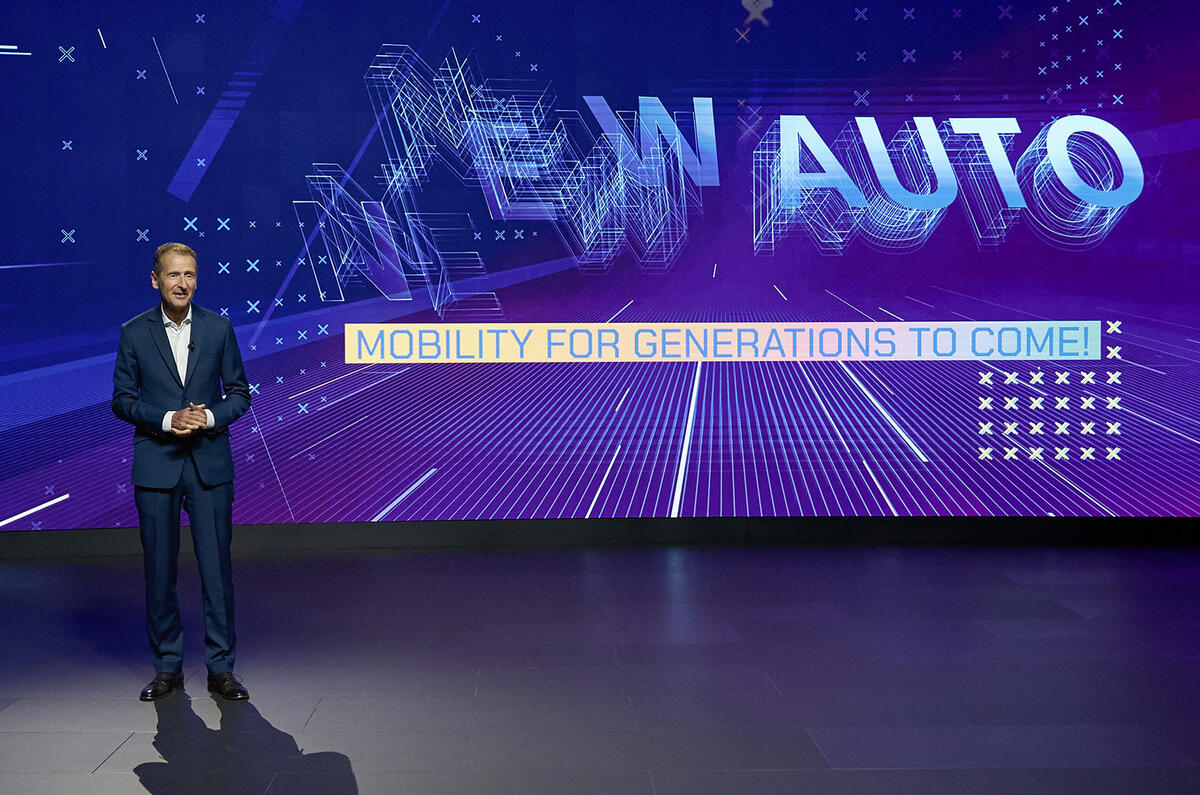The Volkswagen Group has unveiled a bold ‘New Auto’ business strategy that it says will help to grow revenues through an increased focus on electric cars and software-driven services.
Launched by VW Group boss Herbert Diess, the New Auto strategy, will run until 2030 and involve the transformation of the car giant into a “software-driven mobility company”.
The strategy is designed to enable the VW Group – whose brands include Audi, Bentley, Porsche, Seat, Skoda and VW – to capitalise on predicted growth in automotive industry revenue through connected services. It is based on the VW Group’s plans to build on its scale through the increasing use of shared vehicle platforms and software.
The VW Group aims to find new revenue streams by selling car features and services via the internet, and also offer mobility services enabled by autonomous machines.
Diess said the plan was called New Auto “because cars are here to stay”. He added: “Individual mobility will remain the most important means of transport in 2030. People driving or being driven in owned, leased, shared or rented cars will still account for 85% of mobility. And those 85% will be at the core of our business.”
Brands to remain key to VW Group future
While the New Auto plan involves created shared platforms and technology, Diess said that “brands will remain a key differentiator” in the future - and it will organise its marques into more distinct divisions.
Audi has been given greater responsibility for Bentley, Lamborghini and Ducati in the firm’s ‘premium brand portfolio’. Volkswagen will lead the ‘volume’ portfolio that includes Cupra, Seat and Skoda.
Volkswagen Commercial Vehicles will increase its focus on ‘lifestyle’ brands through the California vehicles and the forthcoming ID Buzz. The partnership with Ford will also help make the division more competitive in light commercial vehicles and pick-ups. Diess said the CV division was undergoing “the most radical transformation” of all the group brands.
Porsche will continue as the group’s sports and performance arm, with Diess noting that it “performs in a league of its own”. He said it will retain a “higher degree of independence”, while still becoming more closely integrated in terms of technology.
Focus on EV profits and new revenue streams
The VW Group is expecting battery-electric vehicles to account for 50% of its global sales by 2040, when it says nearly all of its new vehicles in major markets will be zero-emission. The firm is also committed to becoming fully climate-neutral in its operations by 2050.
With the shift to electrification, the VW Group expects the market for internal-combustion-engined vehicles to decline by more than 20% in the next 10 years, with BEVs becoming the largest source of revenue.
“By 2030, the global electric vehicle market will be on par with ICE sales,” said Diess. “We will be more profitable with EVs because batteries and charging will increase the share in value add and with our platforms we will be more competitive.”








Join the debate
Add your comment
You'd think twice about VW pinning their hopes on software - the track record is pretty poor. £27bn spent trying to buy their way out of trouble from it's dieselgate software "issue". Then the 28,000 complaints VW UK recieved from owners who had the revised software installed after the dieselgate scandal came to light, then the software issue with the 1.5 petrol engine which was swiftly followed by the ID3 software issue that delayed the launch of the car which they then couldn't sort out so sold the cars anyway but with a partial fix. Wouldn't trust them to restart my phone, let alone rely on software for my car. Trying to move on too fast for its own good.
What a load of nonsense. VW sound very confused about who they are and where they are going. I'm starting to think that they won't be the winners in all this... because they are losing sight of their strengths and trying to be on trend rather than genuinely setting the pace.